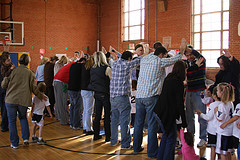Strategies to Help Work with Parents to Get the Best Results
Speak with any junior coach and they will assure you one of the most challenging aspects of their role is dealing with difficult parents. No coach would state this is the case for all parents, but those that do prove to create issues for a coach, long remain in their memory.
As a junior coach, your relationship with player’s parents is vital to creating the best scenario for the athlete to succeed and develop. One of the many aspects of coaching which does have a clear impact on your player’s perception of you is if they feel you are trustworthy and honest. A poor relationship with a parent has the potential to affect a player’s perception. If in a negative context, this can create barriers that will take an extended period of time to overcome, that is of course if you can break them down at all.

To try and prevent a toxic relationship from forming with your players parents there are a number of strategies you can employ which will help you create the best atmosphere for cooperation and coordination.
The starting point for all good relationships begins with communication. Never miss an opportunity to communicate with your players and their parents/guardians. This should be started early to help set an expectation about how this communication will happen. As a coach taking the first step will help you assert direction over the communication and provide a positive sign for all people involved in the team about how things will be running.
The second strategy is to provide opportunities to have parents to become involved. Most junior teams do not an endless amount of resources at their disposal. Junior teams rely heavily on fundraising and volunteers to largely make any sporting event or competition happen. While having parents involved with their own children in a coaching capacity is not encouraged, parents can fill many gaps within your program. Examples of possible roles could be videoing games, scouting opposition teams or keeping detailed games statistics just to name a few.
The scope of your team with junior athletes extends past the players and staff and includes to a degree their parents/guardians. Provide opportunities for parents to take part in team building or social activities. Drawing parallels between the strength in family and the desired strength between team members is a valuable comparison in many young athletes’ minds. Activities such as team dinners, camping adventures, and many others are just some of the activities that can be easily undertaken with the help and support of your parent base.
Finally, many coaches never choose to start managing the relationship between their parents/guardians so when things go wrong they have no process or strategy to fall back on. If a parent has an issue, it does help if they have a process to follow in raising this with the coach or staff. Too often coaches never give a guideline on how conflict should be handled. If you prefer the parent to come and see you then feel free to set this as your strategy, if you prefer to have all complaints lodged with the club, school, association management then that is a strategy as well. The key though is establishing clear guidelines so issues do not get out of hand before you have an opportunity to be dealt with.
Far too many coaches stone wall their players parents and cut them off from the group. This only breeds a shadow culture amongst your team’s biggest supporters and your possible fan base. Parents will always be a constant within junior competition so as a coach you need to develop strategies and skills in making these interactions into positive experiences for everyone involved. By and large most parents want to help as much as you let them, the skill in coaching is knowing where these boundaries exist and how you can channel these efforts into something wonderful for your team.






Leave a Reply